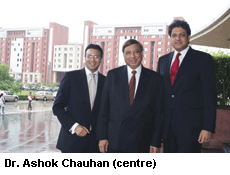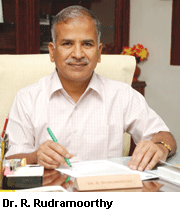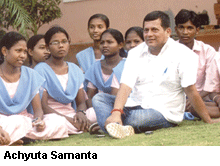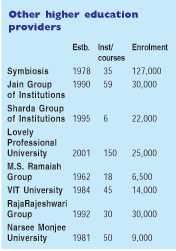For over 150 years since the once-great universities of Calcutta, Bombay and Madras were established in 1857 as a gift to the people of India to mark the transfer of power in the subcontinent from the East India Company to imperial Great Britain, higher education has been dominated by governments at the Centre and in the states. Over half a century later, Delhi University was promulgated in 1922 by the government. Since then, the number of Central government-funded universities has risen to 42 with the great majority of the country’s 533 universities and 31,000 undergraduate colleges funded by state governments.
After independence was wrested from Britain in 1947, one of the most visionary contributions made to national development by the country’s first prime minister Jawaharlal Nehru was the promotion and establishment of the Indian Institutes of Technology (IITs), and postgrad institutions such as the Indian Institutes of Management and Jawaharlal Nehru University. But as a committed socialist, Nehru was ideologically opposed to privately promoted institutions of higher education, although his government didn’t ban them, perhaps because Article 30 of the Constitution of India confers a fundamental right on all minorities to “establish and administer educational institutions of their choice”. Therefore despite official discouragement and being made to jump through numerous bureaucratic hoops and hurdles, determined educationists intent upon helping their local communities access higher education, promoted colleges of professional and general education across the country.
Since then, some of these pioneer private initiatives in higher education have established good reputations and have been conferred the status of private deemed universities. Currently, there are 130 deemed universities with an aggregate enrolment of 1 million students countrywide. Among them, Manipal and Amity universities have established excellent reputations in India and abroad. Some prominent private initiatives which over the years have enabled millions of youth who would not — but for their promotion — have been able to access higher education, are profiled below.
Manipal Education Group
Founded in 1953 by the legendary educationist Dr. T.M.A. Pai (1898-1979) as the Manipal Academy of Higher Education, Manipal University (MU) is among the oldest and most respected higher education institutions in the country. The first privately promoted professional education (medicine and engineering) college to be accorded the status of a deemed university in 1993 by the Union government, Manipal Univer-sity has 20 constituent institutions offering dental, engineering, architecture, nursing, allied health, pharmacy, management, communication, infor-mation science, hotel management, biotechnology and regenerative medicine study programmes.
Today, Manipal University offers 264 study programmes across 14 professional streams to 90,000 students from 52 countries, and boasts an alumni base of over 75,000 students around the world. An entirely self-financed university, MU is also India’s first private sector education multinational with colleges in Dubai, Malaysia, Nepal and the West Indies.
.gif) Dr. Ranjan Pai, is the Bangalore-based chief executive of the Manipal Education and Medical Group International India Pvt. Ltd (aka MEG). Excerpts from an interview:
Dr. Ranjan Pai, is the Bangalore-based chief executive of the Manipal Education and Medical Group International India Pvt. Ltd (aka MEG). Excerpts from an interview:
What is the USP or outstanding contribution of Manipal University to higher education in India?
Today, Manipal University is a synonym for quality professional education and rich multi-cultural experiences that shape the mindset and critical perspectives of the next generation of the intelligentsia. Our credibility and pioneering work in the field of higher education has transcended national borders to take root in several other countries.
How satisfied are you with the pace of growth of MEG?
The Manipal Education Group is happy with the growth we have experienced in the past few years. But when I compare our progress with the educational needs of the country, I realise there is urgent need to do more.
How enabling are Central and state government policies for establishing new education institutions?
The Indian education sector is over-regulated and riddled with complexities which pose huge barriers. There are way too many regulatory bodies at the state and Central levels. Moreover, there are regulatory bodies at course levels which make it cumbersome for education instit-utions to align their infrastructure and systems to comply with all authorities of state and Central governments. The way forward is to establish a single window regulatory system that monitors all education systems across the country.
What are your future growth and development plans?
Over the next three years, MEG plans to promote five universities in India with 50,000 students studying in our various programmes, and about 40,000 students graduating annually from our universities.
Amity Group
 In the early 1990s after the fall of the berlin wall, Dr. Ashok K. Chauhan, who between 1960-90 had established the Frankfurt-based AKC Group into a multibillion dollar conglomerate to emerge as Germany’s premier businessman of Indian origin, reverse migrated to India to focus on the growth and development of the Amity Group of education institutions.
In the early 1990s after the fall of the berlin wall, Dr. Ashok K. Chauhan, who between 1960-90 had established the Frankfurt-based AKC Group into a multibillion dollar conglomerate to emerge as Germany’s premier businessman of Indian origin, reverse migrated to India to focus on the growth and development of the Amity Group of education institutions.
Since then, the Amity Group’s K-12 and higher education institutions have multiplied with unprecedented speed and purpose. Today the Amity Group comprises five universities, 17 schools and 150 other institutions of education, with 85,000 students and 3,500 faculty spread over 30 campuses in India and six abroad. Excerpts from an interview with Dr. A.K. Chauhan, the founder-chairman of the Amity Group.
What is the outstanding contribution of the Amity Group to higher education in India?
Over the past 25 years, we have produced future leaders who are not only equipped with contemporary professional education but are also inculcated with India’s rich values and sanskaars, which permeate the culture of Amity. Moreover, in terms of technology and research, Amity is the most hi-tech university in India with our faculty having filed over 220 patents in the recent past. Amity is also the first university in the country which has adopted the practice of faculty filing patents before publishing papers.
How satisfied are you with the pace of growth of Amity University/Group?
For us in the Amity Group, providing education of highest quality is the most important priority. Although the general opinion is that our growth over the past decade has been phenomenal, we have taken care to grow at a pace at which we can steadily provide best quality education.
How enabling are Central and state government policies for establishing new education institutions?
India has 355 universities for a population of 1.2 billion. We need 7,000 more universities to attain the same level of education as the US has for its population of 300 million.
Realising the far-reaching consequences of the prevailing situation, the Central and state governments have tweaked and fine tuned their policies to encourage and support new educational institutions. Many state governments have invited us to establish Amity univer-sities and campuses and we are talking with them. Government policies are increasingly encouraging private initiatives in education, especially in vocational education which is the backbone of the country’s development.
What are your future growth and development plans?
To provide international exposure to our students, the Amity Group will maximise its international presence in the near future through setting up Amity campuses abroad and forging joint ventures with globally respected educational institutions. With six functioning campuses today, we intend to establish additional campuses in 25 countries over the next few years.
Amity is also a hub of research activities with the largest and most proactive teams of scientists and researchers leading the way in various cutting edge areas of science and technology. Our goal is to become the biggest private contributor through public-private partnerships in nation building activities. We are also determined to make the biggest contribution in the areas of science, technology and innovation, first in India and then globally.
PSG Group
 Promoted by the P.S. Govindaswamy Naidu and Sons Charities Trust (estb.1926), the Coimbatore-based PSG Group comprises 14 institutions including several schools and colleges, all located in the Coimbatore district of Tamil Nadu. The group currently has over 25,000 students and 3,000 teaching and support staff on its rolls.
Promoted by the P.S. Govindaswamy Naidu and Sons Charities Trust (estb.1926), the Coimbatore-based PSG Group comprises 14 institutions including several schools and colleges, all located in the Coimbatore district of Tamil Nadu. The group currently has over 25,000 students and 3,000 teaching and support staff on its rolls.
Among the highly reputed institutions of the PSG Group are PSG Industrial Institute (estb.1926); PSG Polytechnic College (1939); PSG College of Arts and Sciences (1947); PSG College of Technology (1951); PSG Institute of Medical Sciences and Research (1985); PSG Institute of Management (1994); and PSG Institute of Advanced Studies (2008).
Hemalatha Raghupathi interviewed Dr. R. Rudramoorthy, principal, PSG College of Technology, Coimbatore.
What is the most noteworthy contribution of the PSG Group to higher education in India?
Our focus is on moulding entrepreneurs and we are proud of the fact that we have produced more than 1,000 entrepreneurs who have successfully established enterprises in and around Coimbatore and other parts of India, the USA and other countries.
How satisfied are you with the pace of growth of the PSG Group?
We are highly satisfied with our growth though we are more focused on quality than numbers.
How enabling are Central and state government policies for establishing new education institutions?
We are comfortable with state and Central government policies which have contributed to our growth.
What are your future growth and development plans?
We have drawn up plans for growth in areas like biomedical, bio-science and technology and will continue to improve infrastructure and other facilities of our institutions. Our current focus is on international collaborations for all PSG institutions.
KIIT Group
 Started by Achyuta Samanta, an orphan who struggled through the education system to acquire a Masters in chemistry from Utkal University, as a two-room technical training centre in 1992, the Bhubaneswar-based Kalinga Institute of Industrial Technology (KIIT) has blossomed into one of the largest education conglomerates in eastern India, offering kindergarten to post-doctoral education. Currently, the KIIT Group includes KIIT University spread over 25 sq. km with 17 fully-wired campuses and 22 constitutent schools offering 50 study progra-mmes to over 17,000 students. Moreover, in 2007 the KIIT Group promoted the state-of-the-art KiiT International School, Bhubaneswar affiliated with CBSE, Cambridge International Examinations, UK and IBO, Geneva examination boards.
Started by Achyuta Samanta, an orphan who struggled through the education system to acquire a Masters in chemistry from Utkal University, as a two-room technical training centre in 1992, the Bhubaneswar-based Kalinga Institute of Industrial Technology (KIIT) has blossomed into one of the largest education conglomerates in eastern India, offering kindergarten to post-doctoral education. Currently, the KIIT Group includes KIIT University spread over 25 sq. km with 17 fully-wired campuses and 22 constitutent schools offering 50 study progra-mmes to over 17,000 students. Moreover, in 2007 the KIIT Group promoted the state-of-the-art KiiT International School, Bhubaneswar affiliated with CBSE, Cambridge International Examinations, UK and IBO, Geneva examination boards.
Excerpts from an interview with Dr. Samanta.
What is the outstanding contribution of the KIIT Group to higher education in India?
Over the past 14 years, KIIT University has established itself as a premier institution of higher education in eastern India, and one of the most internationally connected varsities in India with academic collaboration agreements with 60 universities of repute around the world.
How satisfied are you with the pace of growth of the KIIT Group?
The pace of growth of the KIIT group of institutions has exceeded everyone’s expectations. From 12 students and two teachers in 1992, KIIT had by 2007 introduced professional study programmes such as MBBS, BDS, rural management, biotechnology, law etc. Within this short period, KIIT has been established as a stable organisation with an excellent nationwide reputation and international exposure. I am both surprised and satisfied with what we have achieved to date.
How enabling are Central and state government policies for establishing new education institutions?
Education policy formulators at the Centre and state government levels are giving great encouragement to new educational institutions established in different parts of the country.
What are your future growth and development plans?
Consolidation of our current operations and improving the quality and excellence of study programmes that KIIT University and our schools offer.
